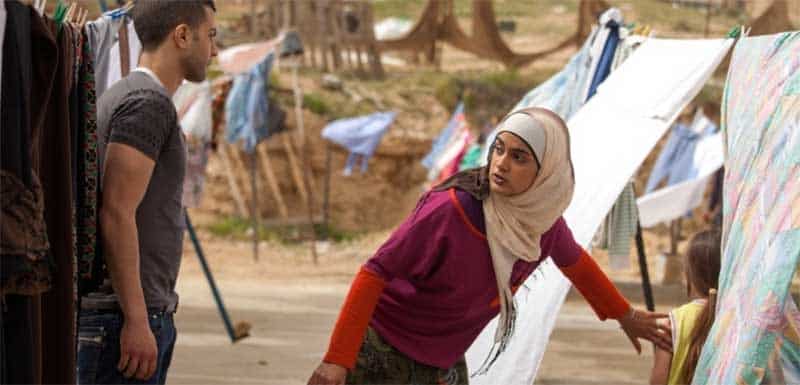Sand Storm is an Arabic language film about a Bedouin family in Southern Israel and their struggle to live within the limits of tradition. There are spoilers ahead.
The main characters are a teenager, her mother, and her father. The teen, Layla (Lamis Ammar) is a student. Her mother Jalila (Ruba Blal) accidentally discovers from Layla’s phone that she has a boyfriend she’s met at school.
Merely talking to a boy, having phone conversations with him, is forbidden. But Anwar (Jalal Masrwa) is from another village, which makes it worse. This news precipitates a crises in the family.

That crises comes right in the middle of another crisis. Layla’s father Suliman (Hitham Omari) takes a second wife. The implication is it’s because she’s pregnant, but they don’t come right out and say it.
Jalila must host the wedding. Suliman puts the new wife in a nicer house than Jalila and her four daughters have. He forgets to keep the generator running so Jalila and her children have no electricity. The food spoils. The washing machine won’t run so the laundry after the big wedding must be done by hand. He brings home a truck full of furniture for the new wife. Jalila is seething.
Layla must wear a dress and cover her head. Her three younger sisters run freely, wear jeans and tee shirts. Her father dresses in western clothing and smokes American made cigarettes. They drive a Toyota. Outside influences stop right there; they don’t extend into examining the meaning of patriarchy and how it constricts everyone.
The women in the family wage a constant battle against dust. Everything lives and moves in a coating of dust. There’s no actual sand storm in the film, just a constant infiltration of dust. The storms are internal.

Anwar shows up at Layla’s house. A forbidden move. He thinks he can talk sense to her father. He cannot.
Anwar’s appearance and Layla’s rebellion causes her father to call a village meeting. He says he has to do it. Layla doesn’t understand why he has to do anything. The upshot of the meeting is that a husband the village approves is picked for Layla.
Jalila defends Layla’s right to a better match. Maybe not Anwar, but certainly not the dud her father picked out. For speaking up against her husband, Jalila is banished. Jalila is sent back to her parents house. There are many aspects of the banishment that I don’t grasp culturally. I’m not sure what it means in the long term. Layla is expected to take care of her 3 younger sisters now.
Layla pushes back against the idea from both her parents that they have no choice but to submit to the traditions of their culture. She takes her father’s truck and is going to run away with Anwar. She’s almost there when she finally faces what it will mean to her mother and her family if she carries out her desire to decide her own future.
The final scene is Layla staring at her still free younger sister Tasnim (Khadija Al Akel) with the desperate understanding of what awaits her.
The film is beautifully written and directed. As an American woman who has struggled impatiently for the rights of women all my life, I find films like this one depressing, but also a much needed reminder of what many women around the world face every day.
Elite Zexer wrote and directed Sand Storm, which is currently streaming on Netflix. The original title is Sufat Chol. Sand Storm won Best Film at the Ophir Awards—Israel’s version of the Academy Awards. There’s an excellent interview with Elite Zexer at MovieMaker, if you’re interested in learning more about this film.

Leave a Reply